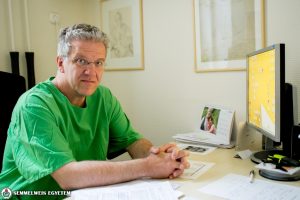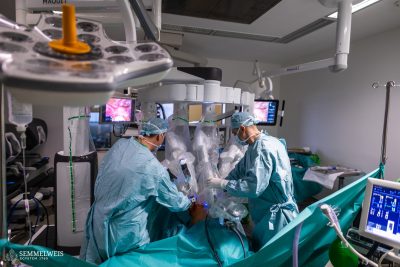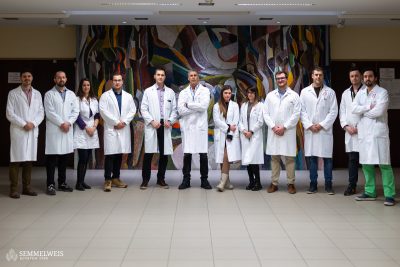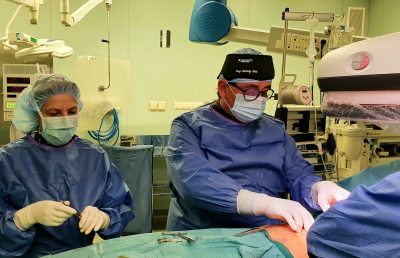For the first time in Hungary, the life of a baby born with esophaegal obstruction was saved by a procedure called “keyhole surgery” at Semmelweis University’s 1st Department of Paediatrics. The new-born’s esophagus was incomplete, therefore the baby’s nutrition was impossible. Instead of opening up the child’s thorax, the upper and lower parts of the esophagus were joined by a thoracoscopic procedure.
 “This was the first minimally invasive surgery of the esophaegus in Hungary, which was carried out on a child born with a rare developmental disorder, esophaegal atresia.”, said Dr. Attila Kálmán, paediatric surgeon and leader of the surgical team performing the thoracoscopic procedure.
“This was the first minimally invasive surgery of the esophaegus in Hungary, which was carried out on a child born with a rare developmental disorder, esophaegal atresia.”, said Dr. Attila Kálmán, paediatric surgeon and leader of the surgical team performing the thoracoscopic procedure.
The upper part of the esophagus coming from the pharynx had a dead end in the thorax, and the lower part coming from the stomach was connected to the trachea with a fistula. During the operation the fistula had to be closed up and the upper and lower parts of the esophagus had to be connected.
“As the child’s nutrition was impossible, immediate intervention was needed. Up till now such procedures had been performed by opening up the thorax. This was the first thoracoscopic procedure carried out with three thin tubes which enabled us to restore the continuity of the esophagus without causing significant scarring.”, Dr. Attila Kálmán pointed out.
There is scarcely any scar tissue remaining, which reduces the risk of infection compared to a traditional operation, and it also prevents the development of long-term orthopaedic problems, such as postural asymmetry and scoliosis.
In Hungary, one child out of every 3-4,000 live births is affected by obstructed esophagus, amounting to 20-30 cases a year, out of which ten are treated at Semmelweis University’s 1st Department of Paediatrics.
“Keyhole procedures are not only applied in the case of obstructed esophagus, they are becoming more and more widely used. Minimally invasive surgery has started to replace greater abdominal and thoracic surgeries especially in case of complex problems and younger children.”, Dr. Attila Kálmán said.
Tímea Kele
Photo: Attila Kovács – Semmelweis University
Translation: Ágnes Raubinek


